Module 10 On the radio Unit 3 Language in use课件(共48张PPT)
文档属性
| 名称 | Module 10 On the radio Unit 3 Language in use课件(共48张PPT) | 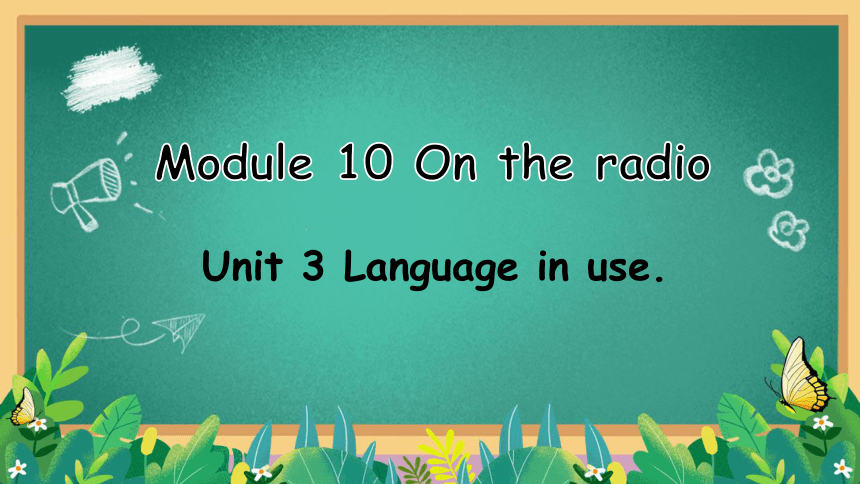 | |
| 格式 | pptx | ||
| 文件大小 | 3.2MB | ||
| 资源类型 | 教案 | ||
| 版本资源 | 外研版 | ||
| 科目 | 英语 | ||
| 更新时间 | 2024-01-15 14:10:04 | ||
图片预览

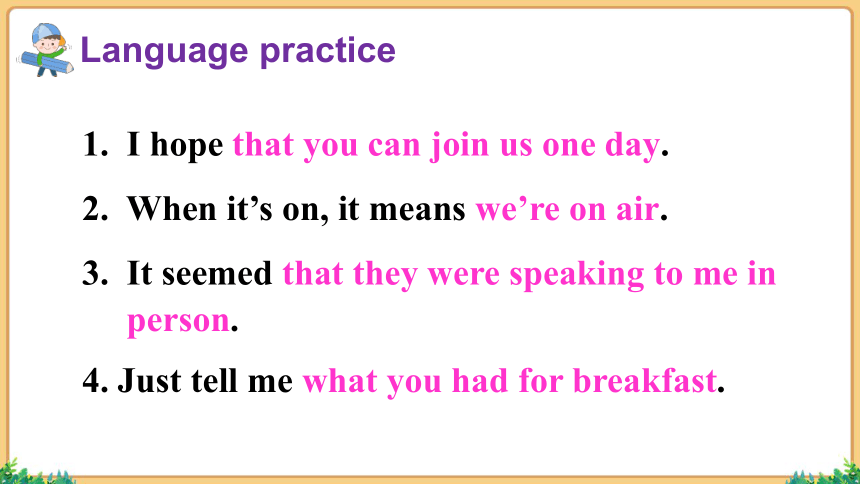

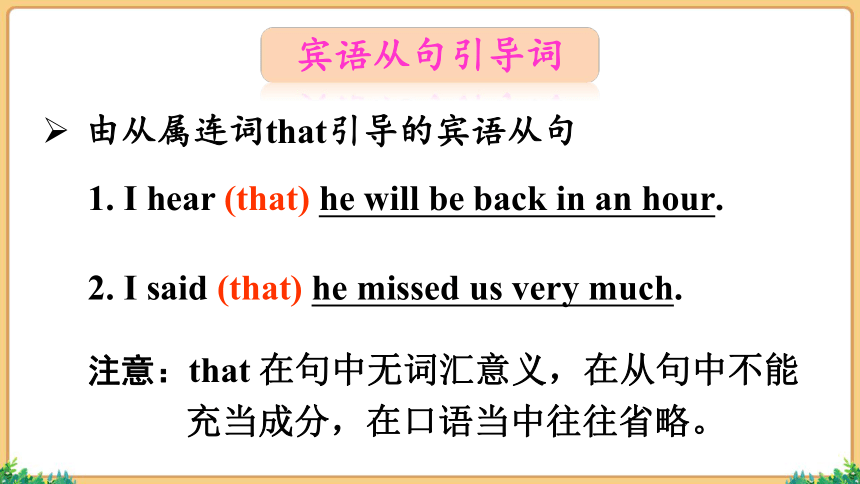
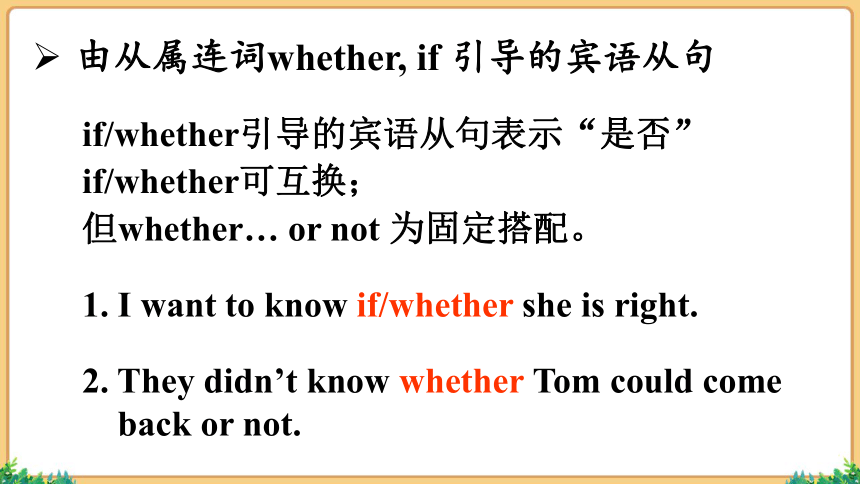
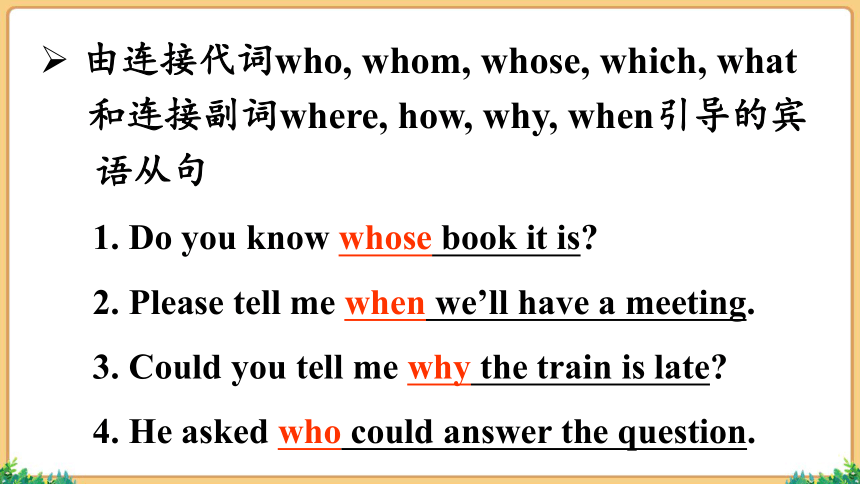
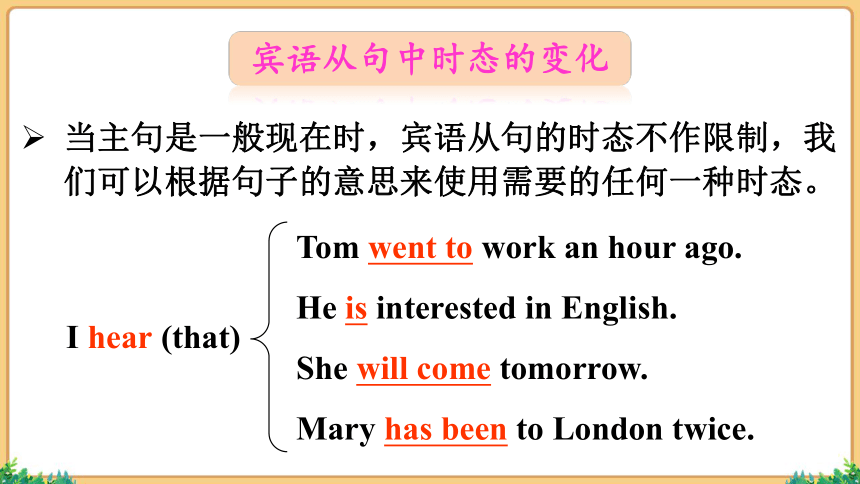
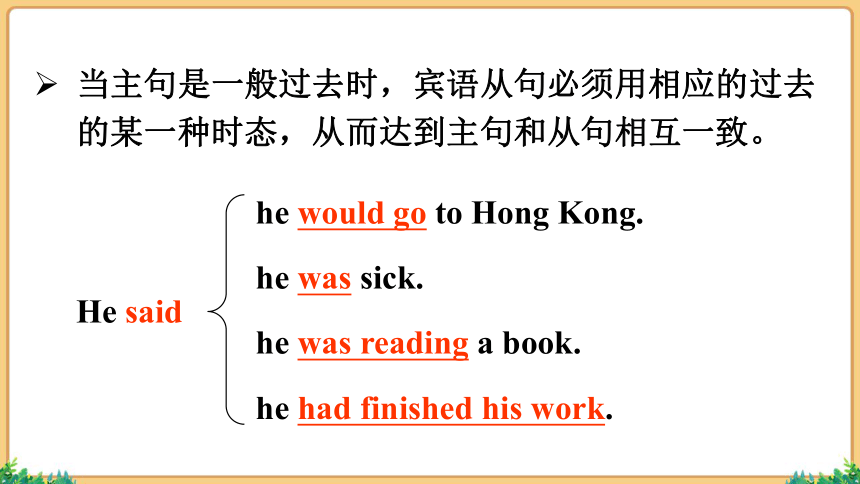
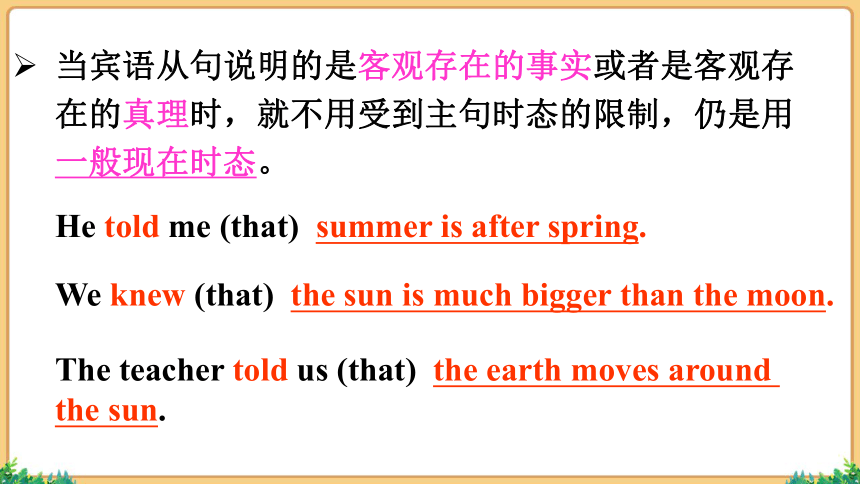
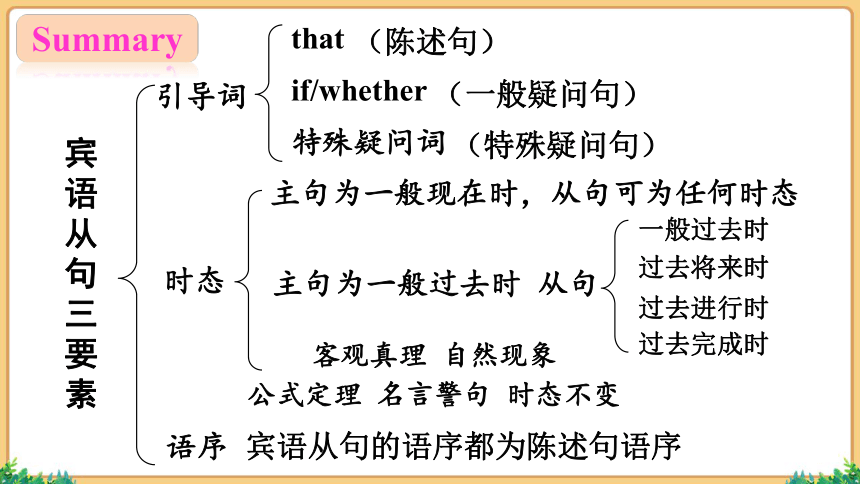
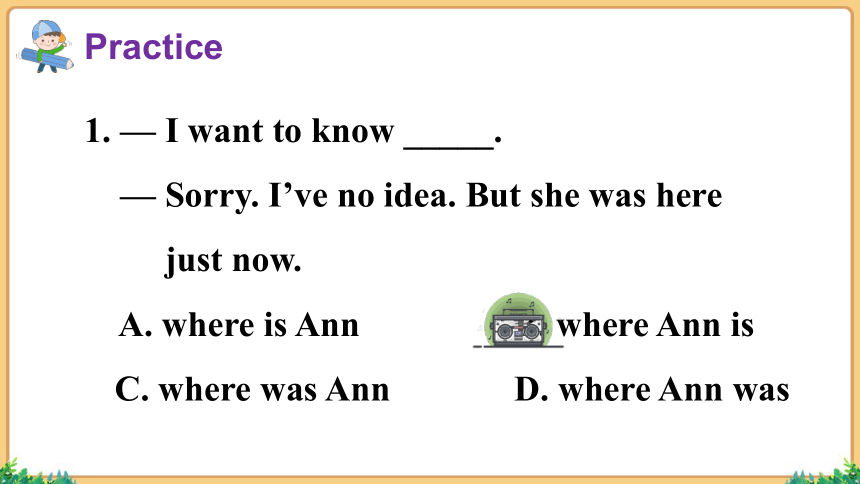
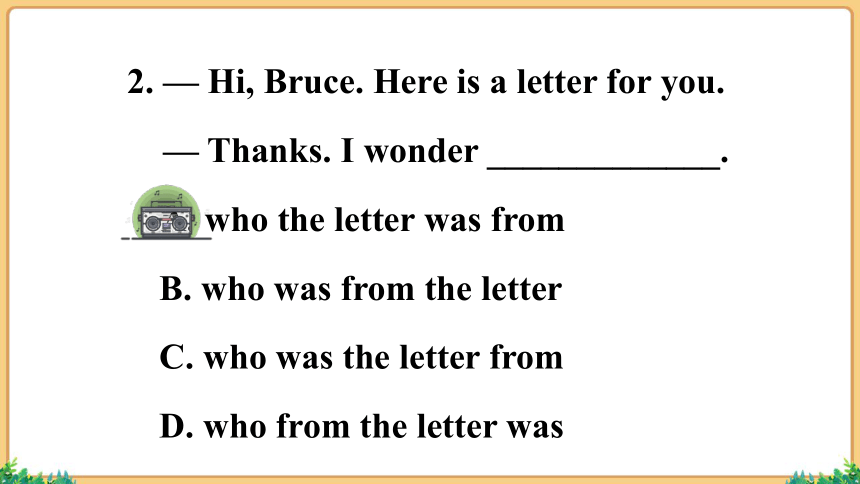
文档简介
(共48张PPT)
Module 10 On the radio
Unit 3 Language in use.
1. I hope that you can join us one day.
2. When it’s on, it means we’re on air.
3. It seemed that they were speaking to me in
person.
4. Just tell me what you had for breakfast.
Language practice
Review
We know him.
什么是宾语从句?
We know he likes English.
简单句
复合句
主
谓
宾
主
谓
宾
主
谓
宾
宾语从句就是用一个句子来构成主句的宾语。
宾语从句引导词
由从属连词that引导的宾语从句
1. I hear (that) he will be back in an hour.
2. I said (that) he missed us very much.
注意:that 在句中无词汇意义,在从句中不能
充当成分,在口语当中往往省略。
由从属连词whether, if 引导的宾语从句
if/whether引导的宾语从句表示“是否”
if/whether可互换;
但whether… or not 为固定搭配。
1. I want to know if/whether she is right.
2. They didn’t know whether Tom could come
back or not.
由连接代词who, whom, whose, which, what
和连接副词where, how, why, when引导的宾
语从句
1. Do you know whose book it is
2. Please tell me when we’ll have a meeting.
3. Could you tell me why the train is late
4. He asked who could answer the question.
宾语从句中时态的变化
当主句是一般现在时,宾语从句的时态不作限制,我们可以根据句子的意思来使用需要的任何一种时态。
I hear (that)
Tom went to work an hour ago.
He is interested in English.
She will come tomorrow.
Mary has been to London twice.
当主句是一般过去时,宾语从句必须用相应的过去的某一种时态,从而达到主句和从句相互一致。
He said
he would go to Hong Kong.
he was sick.
he was reading a book.
he had finished his work.
当宾语从句说明的是客观存在的事实或者是客观存在的真理时,就不用受到主句时态的限制,仍是用一般现在时态。
He told me (that) summer is after spring.
We knew (that) the sun is much bigger than the moon.
The teacher told us (that) the earth moves around
the sun.
Summary
宾
语
从
句
三
要
素
引导词
that
if/whether
特殊疑问词
(陈述句)
(一般疑问句)
(特殊疑问句)
时态
主句为一般现在时,从句可为任何时态
主句为一般过去时 从句
一般过去时
过去将来时
过去进行时
过去完成时
客观真理 自然现象
公式定理 名言警句 时态不变
语序
宾语从句的语序都为陈述句语序
1. — I want to know _____.
— Sorry. I’ve no idea. But she was here
just now.
A. where is Ann B. where Ann is
C. where was Ann D. where Ann was
Practice
2. — Hi, Bruce. Here is a letter for you.
— Thanks. I wonder _____________.
A. who the letter was from
B. who was from the letter
C. who was the letter from
D. who from the letter was
3. — Could you tell me __________
I’m going to pick you up at the airport.
— At 15:45 this Friday.
A. where you met me
B. who you are coming with
C. when you came here
D. what time you are arriving
4. The woman asked the policeman where ______ _____________.
A. the post office is B. was the post office
C. is the post office D. the post office was
1. The listeners tell us …
2. They were happy to
know …
3. He asked …
4. Did they know …
5. Have you heard …
a) … when she came into
this room.
b) … what they want to hear.
c) … that they won the first
prize last week.
d) … that he will come
e) … what he was doing at
that time
1
Match the two parts of the sentences. There may be more than one possibility.
2
Complete the conversation with the words in the box.
how if that when who why
Tony: Hello, everyone! Thanks for waiting-now I can
tell you (1) ______ has won the English
Writing Competition. It’s Linging! Linging,
tell us, (2) _____ do you feel
Linging: Well, I feel great. I was quite surprised (3)
______ I heard (4) ____ I was the winner.
who
how
when
that
Tony: I don’t know (5) _____ you were surprised.
You’ve always been the best at writing in the
school.
Linging: I don’t know about that! A lot of other
students are good at writing as well.
how if that when who why
why
Tony: But there’s only one winner. Well done, Linging!
What’s the prize
Linging: It’s an electronic dictionary.
Tony: Fantastic! And (6) ____ you want to read
Linging’s article, you can find it in the
school magazine.
how if that when who why
if
3
Read the conversation in Activity 2 again
and complete Daming’s diary.
18th May Saturday
I have heard that Linging (1) ____________________
____________________. Tony said (2)_______________
__________ at the news in the beginning. I know (3) ______________ an electronic dictionary, and I think (4)
_______ fantastic. I have decided (5)_______________
__________________. Then maybe next time I will write
an article for the competition.
has won the English
Writing Competition
Linging was quite
the prize is/was
it is
that I will practise
surprised
my English writing
4
Complete the passage with the correct
form of the expressions in the box.
be on air in person make noise
show you around the end of
I am going to (1) _________________ the radio station. When the red light is on, it means we (2) __________. You have to avoid (3) _____________. I know some of you would like to work in radio. I will introduce you to the presenters.
show you around
are on air
making noise
They will talk to you (4) __________. This screen shows us what is happening in the world. The first programme of the day starts at 5 am, and the station closes down at 12 pm. OK, that is (5) __________ the tour. Has anyone got any questions
be on air in person make noise
show you around the end of
in person
the end of
A newspaper reporter.
A radio presenter.
A newsreader.
5
Listen and say what Kate’s job is.
6
Listen again and complete Kate’s timetable.
10 am Kate _____ in a park.
11 am _________________________________________
4 pm The programme _______.
In the first part of the shows, Kate __________ her
guests.
Then the ___________ comes in. This takes about
_____ minutes.
After that is the _______________.
Finally listeners _______ the station and _______ Kate.
7:30 pm The programme _________.
finishes
runs
Kate listens to the latest news on the radio
starts
interviews
newsreader
five
weather report
phone
talk to
Tapescript
Hello, everyone. I’m Kate. My day starts at about 10 am with a run in the park. I run for about an hour. At 11 am, I listen to the latest news on the radio. Then I meet my team and we prepare the programme.
My programme starts at 4 pm and finishes at 7:30 pm. Before I begin, I think about my listeners.
I imagine that I am talking to them in person. That makes my radio show feel personal. People seem to like that. In the first part of the show, I interview my guests. Then the newsreader comes in. The newstakes about five minutes. After the news is the weather report, and then the phone-in.
That’s when listeners phone the station and talk to me. It’s my favourite part of the programme.
7
Read the interview and complete the notes.
John, one of the school radio presenters, interviews Bernard. Bernard was once a student of the school, and he is now very successful in radio.
John: It’s really nice of you to agree to talk to us,
Bernard. I know you’re very busy.
Bernard: I’m very happy to talk to you. I enjoyed my
time at school — it was a good school.
John: It still is. I’m very happy there.
Bernard: So you present programmes for the school
radio station
John: Yes, and we want you to tell us about your
work as a presenter for a popular radio
programme. We want to know how you’ve
become so successful.
Bernard: Well, to become successful, you need to work
hard, you know. And I’ve always worked very
hard. It’s also important to love your job, and
I’ve loved radio since I was quite young.
John: How old were you when you decided you
wanted to work in radio
Bernard: I started presenting music shows for the school
radio when I was fifteen. I became the youngest
presenter of a popular national teenage radio
show when I was seventeen. And then, when I
went to university, I worked on the university
radio station in my free time. After that, it was
easy to get a job with a local radio station in a
small town. And after about two years, a
national radiostation asked me to work for them
I’ve worked for them for four years now.
John: It sounds very easy when you talk about it.
Bernard: It was quite easy, really. If you’re very
interested in something, you usually want to
be good at it. You’ll keep on practising and
you’ll be successful.
John: Thanks. I’ll remember that.
At fifteen years old, Bernard started to (1) __________________.
At seventeen years old, Bernard became the (2) __________ presenter of a teenage radio show.
He has worked for a national radio station for (3) ______ years now.
present music shows
youngest
four
Experiences
To become successful, you need to
(4) _______________.
It is also important to (5) ______________.
work hard
love your job
Opinions
Around the world
The clockwork radio
Trevor Baylis, a British inventor, was listening to a radio programme about health problems in Africa one day. He then realised how much a radio could help African people learn about health and health care.
Electricity and batteries are expensive and hard to get in some parts of Africa, so he developed a clever radio that works without batteries or electricity.
The clockwork or wind-up
radio, first made in South
Africa in the 1990s,
changed the lives of many
African people.
Even in tiny villages which
had no electricity or other
forms of communication,
people began to listen to
the radio, not only for
entertainment, but to educate
themselves too.
Read the article and answer the questions.
1. What is Trevor Baylis
2. What does a radio help African people learn about
3. What did Trevor Baylis develop
A British inventor.
About health and health care.
A clever radio that works without batteries and electricity.
5. Why did African people begin to listen to the radio
4. Did the clockwork radio change the lives of many
African people
Yes, it did.
Not only for entertainment but to educate themselves.
News
Music
Stories
Interviews
Phone-ins
Weather reports
Module task: Making a school radio programme
8
Work in groups. Decide what to include in your school radio programme.
Decide who will write each section.
Write the reports and show them in your group.
9
Write each section of the programme.
10
Do your school radio programme. Try to record it if possible.
11
Present your radio programme to the rest of the class.
中考集训
1. (呼和浩特中考)— Could you please tell me
__________________________
— About twenty minutes ago.
A. when did you see this kid
B. where did you see this kid
C. When you saw this kid
D. Where you saw this kid
2. (武汉中考)— Could you tell me __________
_____ crops this spring
— With the help of farm machines.
A. where shall we plant
B. how shall we plant
C. where we shall plant
D. how we shall plant
3. (烟台中考)My deskmate asked me
______________________________.
A. when would I go to the zoo
B. whom I would play tennis with
C. how did I get home that evening
D. whether I have been to Singapore
4. (呼和浩特中考)— Do you know if he ________ to
play football with us
— I think he will come if he ________ free
tomorrow.
A. comes; is B. comes; will be
C. will come; is D. will come; will be
5. (河北中考)— It’s important for us to know
________ all the subjects.
— Yeah, group work is my favourite.
A. how to study
B. when to study
C. which to study
D. what to study
6. (陕西中考)— Mum, can you tell me______
_____________ I dreamed of him last night.
A. when my dad comes back
B. where my dad goes
C. when my day will come back
D. where my dad will go
7. (呼和浩特中考)— Which dress do you like best,
madam
— Sorry, I can’t decide _________________ now.
A. to buy which one
B. buy which one
C. which one to buy
D. which I should buy it
Homework
1. Review sentences and grammar.
Do your school radio programme, present it to your class and write a essay about you and school radio station.
3. Do the exercises.
Module 10 On the radio
Unit 3 Language in use.
1. I hope that you can join us one day.
2. When it’s on, it means we’re on air.
3. It seemed that they were speaking to me in
person.
4. Just tell me what you had for breakfast.
Language practice
Review
We know him.
什么是宾语从句?
We know he likes English.
简单句
复合句
主
谓
宾
主
谓
宾
主
谓
宾
宾语从句就是用一个句子来构成主句的宾语。
宾语从句引导词
由从属连词that引导的宾语从句
1. I hear (that) he will be back in an hour.
2. I said (that) he missed us very much.
注意:that 在句中无词汇意义,在从句中不能
充当成分,在口语当中往往省略。
由从属连词whether, if 引导的宾语从句
if/whether引导的宾语从句表示“是否”
if/whether可互换;
但whether… or not 为固定搭配。
1. I want to know if/whether she is right.
2. They didn’t know whether Tom could come
back or not.
由连接代词who, whom, whose, which, what
和连接副词where, how, why, when引导的宾
语从句
1. Do you know whose book it is
2. Please tell me when we’ll have a meeting.
3. Could you tell me why the train is late
4. He asked who could answer the question.
宾语从句中时态的变化
当主句是一般现在时,宾语从句的时态不作限制,我们可以根据句子的意思来使用需要的任何一种时态。
I hear (that)
Tom went to work an hour ago.
He is interested in English.
She will come tomorrow.
Mary has been to London twice.
当主句是一般过去时,宾语从句必须用相应的过去的某一种时态,从而达到主句和从句相互一致。
He said
he would go to Hong Kong.
he was sick.
he was reading a book.
he had finished his work.
当宾语从句说明的是客观存在的事实或者是客观存在的真理时,就不用受到主句时态的限制,仍是用一般现在时态。
He told me (that) summer is after spring.
We knew (that) the sun is much bigger than the moon.
The teacher told us (that) the earth moves around
the sun.
Summary
宾
语
从
句
三
要
素
引导词
that
if/whether
特殊疑问词
(陈述句)
(一般疑问句)
(特殊疑问句)
时态
主句为一般现在时,从句可为任何时态
主句为一般过去时 从句
一般过去时
过去将来时
过去进行时
过去完成时
客观真理 自然现象
公式定理 名言警句 时态不变
语序
宾语从句的语序都为陈述句语序
1. — I want to know _____.
— Sorry. I’ve no idea. But she was here
just now.
A. where is Ann B. where Ann is
C. where was Ann D. where Ann was
Practice
2. — Hi, Bruce. Here is a letter for you.
— Thanks. I wonder _____________.
A. who the letter was from
B. who was from the letter
C. who was the letter from
D. who from the letter was
3. — Could you tell me __________
I’m going to pick you up at the airport.
— At 15:45 this Friday.
A. where you met me
B. who you are coming with
C. when you came here
D. what time you are arriving
4. The woman asked the policeman where ______ _____________.
A. the post office is B. was the post office
C. is the post office D. the post office was
1. The listeners tell us …
2. They were happy to
know …
3. He asked …
4. Did they know …
5. Have you heard …
a) … when she came into
this room.
b) … what they want to hear.
c) … that they won the first
prize last week.
d) … that he will come
e) … what he was doing at
that time
1
Match the two parts of the sentences. There may be more than one possibility.
2
Complete the conversation with the words in the box.
how if that when who why
Tony: Hello, everyone! Thanks for waiting-now I can
tell you (1) ______ has won the English
Writing Competition. It’s Linging! Linging,
tell us, (2) _____ do you feel
Linging: Well, I feel great. I was quite surprised (3)
______ I heard (4) ____ I was the winner.
who
how
when
that
Tony: I don’t know (5) _____ you were surprised.
You’ve always been the best at writing in the
school.
Linging: I don’t know about that! A lot of other
students are good at writing as well.
how if that when who why
why
Tony: But there’s only one winner. Well done, Linging!
What’s the prize
Linging: It’s an electronic dictionary.
Tony: Fantastic! And (6) ____ you want to read
Linging’s article, you can find it in the
school magazine.
how if that when who why
if
3
Read the conversation in Activity 2 again
and complete Daming’s diary.
18th May Saturday
I have heard that Linging (1) ____________________
____________________. Tony said (2)_______________
__________ at the news in the beginning. I know (3) ______________ an electronic dictionary, and I think (4)
_______ fantastic. I have decided (5)_______________
__________________. Then maybe next time I will write
an article for the competition.
has won the English
Writing Competition
Linging was quite
the prize is/was
it is
that I will practise
surprised
my English writing
4
Complete the passage with the correct
form of the expressions in the box.
be on air in person make noise
show you around the end of
I am going to (1) _________________ the radio station. When the red light is on, it means we (2) __________. You have to avoid (3) _____________. I know some of you would like to work in radio. I will introduce you to the presenters.
show you around
are on air
making noise
They will talk to you (4) __________. This screen shows us what is happening in the world. The first programme of the day starts at 5 am, and the station closes down at 12 pm. OK, that is (5) __________ the tour. Has anyone got any questions
be on air in person make noise
show you around the end of
in person
the end of
A newspaper reporter.
A radio presenter.
A newsreader.
5
Listen and say what Kate’s job is.
6
Listen again and complete Kate’s timetable.
10 am Kate _____ in a park.
11 am _________________________________________
4 pm The programme _______.
In the first part of the shows, Kate __________ her
guests.
Then the ___________ comes in. This takes about
_____ minutes.
After that is the _______________.
Finally listeners _______ the station and _______ Kate.
7:30 pm The programme _________.
finishes
runs
Kate listens to the latest news on the radio
starts
interviews
newsreader
five
weather report
phone
talk to
Tapescript
Hello, everyone. I’m Kate. My day starts at about 10 am with a run in the park. I run for about an hour. At 11 am, I listen to the latest news on the radio. Then I meet my team and we prepare the programme.
My programme starts at 4 pm and finishes at 7:30 pm. Before I begin, I think about my listeners.
I imagine that I am talking to them in person. That makes my radio show feel personal. People seem to like that. In the first part of the show, I interview my guests. Then the newsreader comes in. The newstakes about five minutes. After the news is the weather report, and then the phone-in.
That’s when listeners phone the station and talk to me. It’s my favourite part of the programme.
7
Read the interview and complete the notes.
John, one of the school radio presenters, interviews Bernard. Bernard was once a student of the school, and he is now very successful in radio.
John: It’s really nice of you to agree to talk to us,
Bernard. I know you’re very busy.
Bernard: I’m very happy to talk to you. I enjoyed my
time at school — it was a good school.
John: It still is. I’m very happy there.
Bernard: So you present programmes for the school
radio station
John: Yes, and we want you to tell us about your
work as a presenter for a popular radio
programme. We want to know how you’ve
become so successful.
Bernard: Well, to become successful, you need to work
hard, you know. And I’ve always worked very
hard. It’s also important to love your job, and
I’ve loved radio since I was quite young.
John: How old were you when you decided you
wanted to work in radio
Bernard: I started presenting music shows for the school
radio when I was fifteen. I became the youngest
presenter of a popular national teenage radio
show when I was seventeen. And then, when I
went to university, I worked on the university
radio station in my free time. After that, it was
easy to get a job with a local radio station in a
small town. And after about two years, a
national radiostation asked me to work for them
I’ve worked for them for four years now.
John: It sounds very easy when you talk about it.
Bernard: It was quite easy, really. If you’re very
interested in something, you usually want to
be good at it. You’ll keep on practising and
you’ll be successful.
John: Thanks. I’ll remember that.
At fifteen years old, Bernard started to (1) __________________.
At seventeen years old, Bernard became the (2) __________ presenter of a teenage radio show.
He has worked for a national radio station for (3) ______ years now.
present music shows
youngest
four
Experiences
To become successful, you need to
(4) _______________.
It is also important to (5) ______________.
work hard
love your job
Opinions
Around the world
The clockwork radio
Trevor Baylis, a British inventor, was listening to a radio programme about health problems in Africa one day. He then realised how much a radio could help African people learn about health and health care.
Electricity and batteries are expensive and hard to get in some parts of Africa, so he developed a clever radio that works without batteries or electricity.
The clockwork or wind-up
radio, first made in South
Africa in the 1990s,
changed the lives of many
African people.
Even in tiny villages which
had no electricity or other
forms of communication,
people began to listen to
the radio, not only for
entertainment, but to educate
themselves too.
Read the article and answer the questions.
1. What is Trevor Baylis
2. What does a radio help African people learn about
3. What did Trevor Baylis develop
A British inventor.
About health and health care.
A clever radio that works without batteries and electricity.
5. Why did African people begin to listen to the radio
4. Did the clockwork radio change the lives of many
African people
Yes, it did.
Not only for entertainment but to educate themselves.
News
Music
Stories
Interviews
Phone-ins
Weather reports
Module task: Making a school radio programme
8
Work in groups. Decide what to include in your school radio programme.
Decide who will write each section.
Write the reports and show them in your group.
9
Write each section of the programme.
10
Do your school radio programme. Try to record it if possible.
11
Present your radio programme to the rest of the class.
中考集训
1. (呼和浩特中考)— Could you please tell me
__________________________
— About twenty minutes ago.
A. when did you see this kid
B. where did you see this kid
C. When you saw this kid
D. Where you saw this kid
2. (武汉中考)— Could you tell me __________
_____ crops this spring
— With the help of farm machines.
A. where shall we plant
B. how shall we plant
C. where we shall plant
D. how we shall plant
3. (烟台中考)My deskmate asked me
______________________________.
A. when would I go to the zoo
B. whom I would play tennis with
C. how did I get home that evening
D. whether I have been to Singapore
4. (呼和浩特中考)— Do you know if he ________ to
play football with us
— I think he will come if he ________ free
tomorrow.
A. comes; is B. comes; will be
C. will come; is D. will come; will be
5. (河北中考)— It’s important for us to know
________ all the subjects.
— Yeah, group work is my favourite.
A. how to study
B. when to study
C. which to study
D. what to study
6. (陕西中考)— Mum, can you tell me______
_____________ I dreamed of him last night.
A. when my dad comes back
B. where my dad goes
C. when my day will come back
D. where my dad will go
7. (呼和浩特中考)— Which dress do you like best,
madam
— Sorry, I can’t decide _________________ now.
A. to buy which one
B. buy which one
C. which one to buy
D. which I should buy it
Homework
1. Review sentences and grammar.
Do your school radio programme, present it to your class and write a essay about you and school radio station.
3. Do the exercises.
同课章节目录
- Module 1 Feelings and impressions
- Unit 1 It smells delicious.
- Unit 2 I feel nervous when I speak Chinese .
- Unit 3 Language in use
- Module 2 Experiences
- Unit 1 I've also entered lots of speaking competi
- Unit 2 They have seen the Pyramids.
- Unit 3 Language in use
- Module 3 Journey to space
- Unit 1 Has it arrived yet?
- Unit 2 We have not found life on any other planet
- Unit 3 Language in use
- Module 4 Seeing the docto
- Unit 1 I haven't done much exercise since I got m
- Unit 2 We have played football for a year now
- Unit 3 Language in use
- Module 5 Cartoons
- Unit 1 It's time to watch a cartoon.
- Unit 2 Tintin has been popular for over eighty yea
- Unit 3 Language in use
- Revision module A
- Module 6 Hobbies
- Unit 1 Do you collect anything ?
- Unit 2 Hobbies can make you grow as a person.
- Unit 3 Language in use
- Module 7 Summer in Los Angeles
- Unit 1 Please write to me and send me some photos
- Unit 2 Fill out a form and come to learn English
- Unit 3 Language in use
- Module 8 Time off
- Unit 1 I can hardly believe we are in the city ce
- Unit 2 We thought somebody was moving about
- Unit 3 Language in use
- Module 9 Friendship
- Unit 1 Could I ask if you've mentioned this to he
- Unit 2 I believe that the world is what you think
- Unit 3 Language in use
- Module 10 On the radio
- Unit 1 I hope that you can join us one day
- Unit 2 It seemed that they were speaking to me in
- Unit 3 Language in use
- Revision module B
